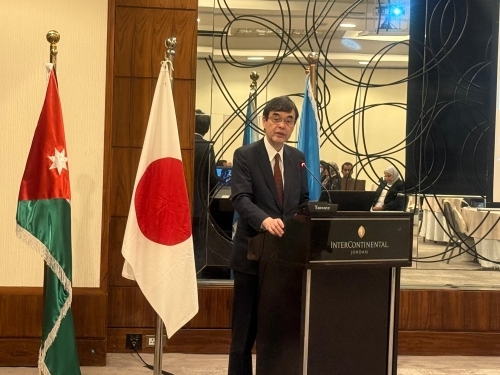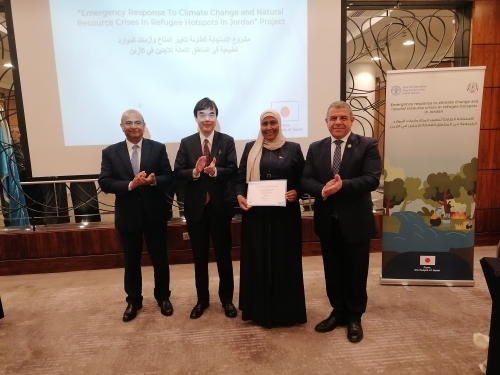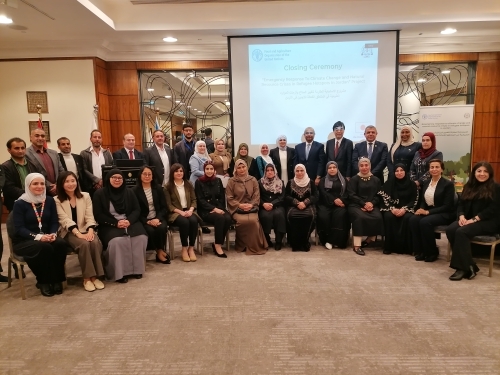Japan Celebrates Successful Conclusion of Japan-Funded Climate Resilience Project in Jordan in Partnership with FAO and Ministry of Agriculture
2025/3/27
Amman, March 26, 2025 – The Food and Agriculture Organization (FAO) of the United Nations, in cooperation with the Ministry of Agriculture in Jordan and with generous funding from the Government of Japan, celebrated today the completion of a vital 12-month project addressing climate and natural resource crises in Jordan’s refugee hotspots. A closing ceremony in Amman marked the project’s significant achievements in supporting hosting communities.
The event was held under the patronage of His Excellency Eng. Khaled Hnaifat, Minister of Agriculture, in the presence of Mr. Hideki Asari, Ambassador of Japan to Jordan, and Eng. Nabil Assaf, FAO Representative and several representatives of project’s stakeholders and government partners.
The project, implemented in Zaatari Refugee Camp as well as Ajloun and Jerash governorates in Northern Jordan, focused on addressing the severe impacts of climate change and natural resource crises, including wildfires and floods.
Notably, 70 hectares of fire-damaged forests were restored, with 58,000 seedlings planted and over 110 temporary green jobs created, including 45 for women. Community-based organizations (CBOs) received training and resources for disaster preparedness and sustainable livelihoods, such as beekeeping. Over 18,000 seedlings were locally produced, and $102,000 USD was invested in job creation and CBO support. The project also facilitated strong partnerships between international organizations, local authorities, and communities, enhancing resilience.
On behalf of the Minister of Agriculture, Secretary General Eng. Mohammed Al-Hayari said: “We at the Ministry of Agriculture value the ongoing partnership with Japan and FAO, and we are working with partners and stakeholders to take all necessary measures to adapt to and mitigate the effects of climate change on the agricultural sector, by working to establish smart projects that take climate change into account and move away from traditional projects.”
Mr. Hideki Asari, Ambassador of Japan to Jordan, highlighted: “Jordan faces significant environmental challenges, particularly wildfires and droughts, which impact the country's small forested areas. These climate-induced challenges not only pose a direct threat to biodiversity and ecosystems, but also endanger nearby communities and their livelihoods, threatening food security. We hope that the project has contributed to enhancing resilience against climate-induced disasters in Jordan, while protecting the livelihoods of target host and refugee communities."
Eng. Nabil Assaf, FAO Representative to Jordan, expressed his appreciation for the collaborative efforts that made the project’s success possible. “This project is a testament to the power of collaboration and the impact that can be achieved when governments, international organizations, and local communities work together. The achievements we celebrate today lay the foundation for a more resilient and sustainable future for both refugees and host communities in Jordan,” Mr. Assaf remarked.
FAO remains dedicated to supporting Jordan’s efforts to address climate change and support vulnerable populations.



The event was held under the patronage of His Excellency Eng. Khaled Hnaifat, Minister of Agriculture, in the presence of Mr. Hideki Asari, Ambassador of Japan to Jordan, and Eng. Nabil Assaf, FAO Representative and several representatives of project’s stakeholders and government partners.
The project, implemented in Zaatari Refugee Camp as well as Ajloun and Jerash governorates in Northern Jordan, focused on addressing the severe impacts of climate change and natural resource crises, including wildfires and floods.
Notably, 70 hectares of fire-damaged forests were restored, with 58,000 seedlings planted and over 110 temporary green jobs created, including 45 for women. Community-based organizations (CBOs) received training and resources for disaster preparedness and sustainable livelihoods, such as beekeeping. Over 18,000 seedlings were locally produced, and $102,000 USD was invested in job creation and CBO support. The project also facilitated strong partnerships between international organizations, local authorities, and communities, enhancing resilience.
On behalf of the Minister of Agriculture, Secretary General Eng. Mohammed Al-Hayari said: “We at the Ministry of Agriculture value the ongoing partnership with Japan and FAO, and we are working with partners and stakeholders to take all necessary measures to adapt to and mitigate the effects of climate change on the agricultural sector, by working to establish smart projects that take climate change into account and move away from traditional projects.”
Mr. Hideki Asari, Ambassador of Japan to Jordan, highlighted: “Jordan faces significant environmental challenges, particularly wildfires and droughts, which impact the country's small forested areas. These climate-induced challenges not only pose a direct threat to biodiversity and ecosystems, but also endanger nearby communities and their livelihoods, threatening food security. We hope that the project has contributed to enhancing resilience against climate-induced disasters in Jordan, while protecting the livelihoods of target host and refugee communities."
Eng. Nabil Assaf, FAO Representative to Jordan, expressed his appreciation for the collaborative efforts that made the project’s success possible. “This project is a testament to the power of collaboration and the impact that can be achieved when governments, international organizations, and local communities work together. The achievements we celebrate today lay the foundation for a more resilient and sustainable future for both refugees and host communities in Jordan,” Mr. Assaf remarked.
FAO remains dedicated to supporting Jordan’s efforts to address climate change and support vulnerable populations.



